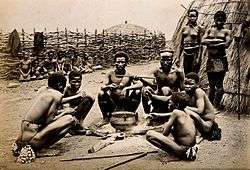Hlubi people
The Hlubi (or AmaHlubi) are a Bantu ethnic group of Southern African, with the majority of population found in KwaZulu-Natal and Eastern Cape provinces of South Africa.
AmaNgelengele | |
|---|---|
| Regions with significant populations | |
| Languages | |
| Hlubi | |
| Religion | |
| African Traditional Religion, Christianity | |
| Related ethnic groups | |
| Swati, Sotho and Southern and Northern Ndebele people |
| Person | iHlubi |
|---|---|
| People | amaHlubi |
| Language | isiHlubi |
| Country | emaHlubini |

Hlubi kings
Below is a traditional estimation of the Hlubi kings that ruled from 1300 till the present day.[1] Note that Hlubi history comes mainly from oral sources and especially the earlier estimated dates may be inaccurate.[2]
| King | Reign |
|---|---|
| Chibi | 1300–1325 |
| Lubelo | 1325–1350 |
| Busobengwe (Bhungane I) | 1350–1370 |
| Fulathel’ilanga | 1370–1390 |
| Bhele | 1390–1410 |
| Lufelelwenja | 1410–1430 |
| Sidwaba (Nkomo) | 1430–1450 |
| Mhuhu | 1450–1475 |
| Mpembe | 1475–1500 |
| Mhlanga | 1500–1525 |
| Musi | 1525–1550 |
| Masoka | 1550–1575 |
| Ndlovu | 1575–1600 |
| Dlamini | 1600–1625 |
| Mthimkhulu I | 1625–1650 |
| Ncobo | |
| Rhadebe | –1675 |
| Dlomo I | 1675–1710 |
| Mashiya | 1710–1720 |
| Ntsele | 1735–1760 |
| Bhungane II | 1760–1800 |
| Mthimkhulu II (Ngwadlazibomvu) | 1800–1818 |
| Mpangazitha (Pakalita) | 1818–1825 |
| Mahwanqa (Regent) | 1825–1839 |
| Dlomo II and later, Mthethwa (commonly known as Langalibalele I) | 1839–1889 |
| Siyephu (Mandiza) | 1897–1910 |
| Tatazela (Mthunzi) | 1926–1956 |
| Muziwenkosi (Langalibalelle ll) | 1974 – |
Language
The amaHlubi speak a dialect closely related to the Swazi language one of the Tekela languages in the Nguni branch of the Niger–Congo language family.
The Hlubi (AmaHlubi) dialect is endangered, and most Hlubi speakers are elderly and illiterate. There are attempts by Hlubi intellectuals to revive the language and make it one of the eleven recognised languages in South Africa.[1]
References
- "Isizwe SamaHlubi: Submission to the Commission on Traditional Leadership Disputes and Claims: Draft 1" (PDF). July 2004. Retrieved 28 July 2011.
- Genealogy
Further reading
- Henry Masila Ndawo (1939). Iziduko zama-Hlubi. Lovedale Press. Retrieved 31 July 2011.
- Henry Masila Ndawo (1945). Ibali lama Hlubi. Lovedale Press. hdl:10962/47224.
- Andrew Hayden Manson. The Hlubi and Ngwe in a colonial society, 1848–1877. s.n. Retrieved 31 July 2011.
- Alfred T. Bryant (1965). Olden times in Zululand and Natal: containing earlier political history of the Eastern-Nguni clans. C. Struik. Retrieved 31 July 2011.
- John Henderson Soga (1930). The south-eastern Bantu: (Abe-Naguni, Aba-Mbo, Ama-Lala). The Witwatersrand university press. Retrieved 31 July 2011.
- John Britten Wright; Andrew Manson (1983). The Hlubi chiefdom in Zululand-Natal: a history. Ladysmith Historical Society. ISBN 978-0-620-06178-0. Retrieved 31 July 2011.
- John William Colenso (1875). Langalibalele and the amahlubi tribe: being remarks upon the official record of the trials of the Chief, his sons and Induna, and other members of the amahlubi tribe. Retrieved 31 July 2011.
- Paul Maylam (1986). A history of the African people of South Africa: from the early Iron Age to the 1970s. St. Martin's Press. ISBN 978-0-312-37511-9. Retrieved 31 July 2011.